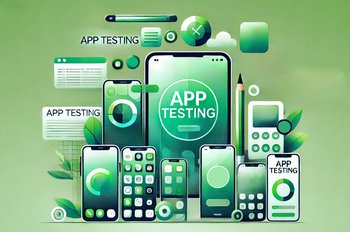In more and more application areas and industries, the first screen contact with the website or app is via smartphones and tablets.
Mobile app testing plays a decisive role, from the private sector to corporate IT and safety-critical device systems, such as in medical technology.
The demands on intuitive usability, functionality, response times, memory requirements and energy efficiency are high. Combined with a multitude of different mobile devices and platforms, software quality assurance and software testing in mobile app testing face a variety of new challenges. We help you to master these mobile testing challenges economically.
What is mobile app testing?

Mobile app testing is the process of checking and validating the functionality, usability and performance of a mobile application on different devices and platforms. It includes various types of tests such as functional tests, usability tests, performance tests, security tests and compatibility tests to ensure that the app works smoothly and meets user expectations. The goal is to identify and fix bugs before the app is released to ensure high quality and a positive user experience.
App testing differs from other software tests due to the specific requirements of mobile applications. It requires tests on different devices and operating systems, takes into account touchscreen interactions, mobile networks and sensor interfaces. Important aspects include performance under real network conditions, the user experience on different screen sizes and enhanced security and data protection measures.
Your benefits of mobile testing with imb
- Test outsourcing: On request, we can take over the entire test process as part of our test outsourcing. T he infrastructure required for multi-device and multi-OS tests is therefore available to you on demand. Here you can find all information about test outsourcing with imbus.
- Service level agreements: The imbus crowd testing service is an uncomplicated, cost-effective option for the quick check of beta versions, the usability check, for benchmarking with competitor applications or for the uncomplicated acceptance test in your target user group.
- Flexible service call-off: Short response times and suitable capacity, whether individual test specialists, a professional test team or a crowd testing solution.
Try the professional test of your app with the "Starter Package"
In the Mobile Starter Package, we provide you with the exploratory test on one end device. This gives you an insight into how you can increase the quality of your app through professional mobile testing. You can be sure: We will find at least one error!
You will receive:
- Informal test specification with app use cases
- Written report of the test results
- Detailed description of the most serious error found
- Further bug descriptions (maximum 15)
- Evaluation of the overall quality of the app
- Estimate for extensive testing on multiple devices and regression tests
App for test outsourcing!
Would you like to have your mobile application tested quickly, efficiently and according to the usual high imbus quality standards? Our experts, who specialise in mobile applications and are certified accordingly, will take a close look at your app as part of our test outsourcing. We have a comprehensive pool of the most popular and widely used smartphones and tablet PCs on the market, which can be used to map a wide variety of device and system combinations at any time. Visit our dedicated test outsourcing website for more information.
Customised modules for your project:
![[Translate to English:] Beispiel Abbildung imbus Testoutsourcing](/fileadmin/_processed_/1/3/csm_Mobile_Testing_imbus_eebce65cc2.jpg)
- Explorative: intuitive troubleshooting
- Functional: testing defined user stories
- Test automation: automated test execution
- Crowd: defined beta tests
- Cloud: virtual test environments
- Usability: intuitive operation
- Load and performance: measuring stability and time behaviour
- "In the wild": outdoor tests, etc.
What do you need to look out for when testing mobile apps?
The dynamic market for mobile apps requires fast and frequent updates as well as the highest quality. Users expect reliable and user-friendly apps, as errors quickly lead to negative reviews. The variety of devices and different hardware specifications require extensive testing on different models. "In the wild testing" under real conditions is essential to ensure app performance in different environments. A professional test strategy, including competent test teams and detailed documentation, is crucial to mastering these challenges.
Below we give you an overview of the most important points to consider when testing mobile apps:
Your contact person at imbus
Mr. Rolf Glunz
mail: softwaretest@imbus.de
phone: +49 9131 / 7518-0
fax: +49 9131 / 7518-50
![[Translate to English:] [Translate to English:]](/fileadmin/Repositories/Imbus/Bilder/Softwaretest_Services/Mobile_Testing/Header_Mobile_Testing.jpg)
